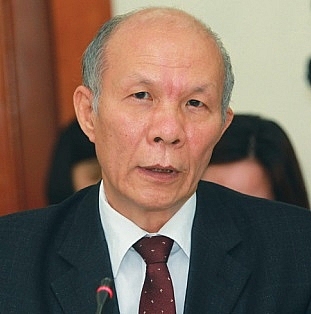Market demand pushes role of consumer finance
Market demand pushes role of consumer finance
After a decade of development, consumer finance firms are now ramping up their transformation from digital adoption which has taken a quantum leap, to how they diversify their loan portfolios and reducing cash loan exposure.

Last week’s seminar featured discussion and viewpoints from various groups involved in consumer finance
|
Vietnam’s consumer finance market remains the game of the three biggest players with their overwhelming market share, namely FE Credit, HD Saison, and foreign-owned Home Credit.
In the last 10 years, FE Credit has emerged as the top player, accounting for around 52 per cent of market share, far ahead of the rivals Home Credit (17 per cent) and HD Saison (11 per cent). Other competitors such as Mcredit, Shinhan Finance, and Mirae Asset make up 7, 6, and 5 per cent of the market, respectively.
According to Truong Thanh Duc, director of ANVI Law Firm, in that time consumer finance has transformed significantly, yet the legal corridor has not changed in parallel.
“The Law on Credit Institutions and the Civil Code remained almost the same, except for regulations on lending rates. In addition, and as of last year there are still only 16 consumer finance companies, which has barely changed over the past few years,” he said at VIR’s seminar last week on the consumer finance market and its decade of development.
In particular, Duc said, black credit fraud such as illegal lending, cut-throat high interest rates, and illegal debt collection businesses are still the biggest roadblocks that hamper the of whole society.
Only five companies are eligible to provide credit card products – FE Credit, Home Credit, Lotte Finance, Viet Credit, and JACCS. Nevertheless, the much-improved infrastructure for cashless payments is envisaged to further facilitate the growth of credit cards and diversify consumer lending products.
Phan Duc Hieu, deputy director at the Central Institute for Economic Management, suggested that Vietnam could consider adopting so-called personal bankruptcy regulations, as in other countries, for debtors who are declared unable to pay their debts.
Lending institutions should be protected because complex disputes that may last for two or three years will otherwise be a major hurdle for their operations.
Director of IT at MCredit Nguyen Manh Khang expressed his view of how consumer finance companies could gain the upper hand thanks to a collaboration with banks and fintech.
“Three years ago, banks or any financial institutions were incredibly concerned about the harsh competition with peer-to-peer (P2P) lending, fintech, and consumer finance firms. However, things have changed drastically as all of these platforms are coming to realise they have substantial resources to effectively co-operate with each other and customers, as we did at MCredit,” Khang said.
Le Trong Minh, VIR’s editor-in-chief added, “COVID-19 and the current Fourth Industrial Revolution have pushed companies. During the pandemic, customers have moved towards online platforms, and that’s why consumer finance companies have to be well-positioned to engage with market trends. Furthermore, online lending models and P2P firms also force consumer finance to transform.”
For example, local and foreign consumer finance firms are now gearing up to implement digital identity verification known as electronic know-your-customer (eKYC), to strengthen their synergies and lift the unsecured loan market to a next level.
FE Credit, Home Credit, Lotte Finance, Mirae Asset, and others are all tapping into eKYC as part of their initiatives to gain immense benefits from paperless procedures, cost savings, and customer satisfaction enhancements.
Besides cutting-edge technology, immense investment from parent banks and a strategic approach play an essential role in companies’ strategic development.
Vietnam’s unsecured loan segment is managing to retain its attractiveness to both local and foreign investors such as Shinhan Finance, HD Saison, and Credit Saison.
However, last week, Hyundai Card – the credit card company of the South Korean automaker – announced that plans to purchase 50 per cent in FCCOM, the consumer finance arm of MSB for nearly $42 million has been called off, despite years of negotiations.
Dinh Trong Thinh, senior lecturer at the Academy of Finance, confirmed that it is of the utmost importance to promote personnel training in consumer finance companies in terms of both professional expertise and also professional ethics.
“Vietnam’s consumer finance sector has only grown for several years, and in such a short period of time the workforce cannot catch up with the lightning speed of the industry’s expansion. Staff in consumer finance need to come up with a solution to help customers get the most complete advice about their rights and obligations before signing any contracts,” Thinh said.
|
Pham Thi Thanh Tung - Deputy general director, Department of Credit for Economic Sectors, SBV
The banking sector in Vietnam continues to accompany and take on a raft of drastic measures to push and ensure the efficiency of credit investments serving consumers’ legitimate demands. With guidance from the State Bank of Virtnam, local credit institutions will concentrate their capital sources on meeting people’s demands in a timely manner. They can boost the application of science-technology progresses and promote online lending and payment services, in parallel to administrative procedure reforms and the simplification of lending processes. Thus, they pave the way for people from all walks of life to access official credit sources at preferential interest rates and supporting economic recovery. Further reviews should be carried out in order to facilitate the expansion of credit institutions in areas where the existing banking network has yet to keep abreast with people’s actual demands for banking services, helping to boost accessibility towards official credit sources by individuals. Last but not least, there is the need to foster dissemination about policies and mechanisms about banking credits to people to inform them about credit provisions from official channels. Phan Duc Hieu - Deputy director, Central Institute for Economic Management
The role and objectives of consumer finance should be perceived objectively and independently. For example, it has been contributing to pushing back black credit due to its relevance, but might not be the major vehicle to repel this negative phenomenon. To beef up the growth of consumer finance, it is better that we let the market develop on its own with the top objective being fully and efficiently satisfying people’s demands. Giving a particular mission to consumer finance and striving to achieve is complex, and over-intervention can hinder development. It is impossible for the state to absolutely prevent risk occurrence. In consumer finance, risk refers to both consumers and institutional credit providers. It is important to improve people’s consciousness about consumer lending. To some extent, consumers should be allowed to face risks and learn their lessons. The state should not take on all the risk to reduce abuse by the ill-doers. The government might consider allowing individuals to ‘go bust’ to settle the debts. In addition, to protect institutional credit providers, it is important to settle contract disputes quickly, impartially, and smartly, as long unsettled contracts could greatly hinder the market’s development. Dinh Trong Thinh - Senior economist
Consumer finance development contributes to enhancing the financial understanding of new customer groups who have a modest income or little access to banking, helping them to better manage personal financial transactions, simultaneously providing a platform to facilitate their access to other financial services, including traditional banking ones. By doing so, consumer finance firms help spur Vietnam’s financial inclusion process with increasing engagement of local households. In the face of COVID-19 and the Fourth Industrial Revolution, financial firms would need to review business strategies in order to optimise efficiency and be attuned to the new development circumstances. Digital technology will bring multiple opportunities for financial firms to expand their customer base, to better avail of the database for risk management, lowering business cost, and enhancing competitiveness. Technology investment is crucial to increase labour productivity while optimising operating cost, operational efficiency, and lifting customer experience. This will help reduce output expenses for consumer finance firms, helping them to soften interest rates for their customers and become more competitive. |




























